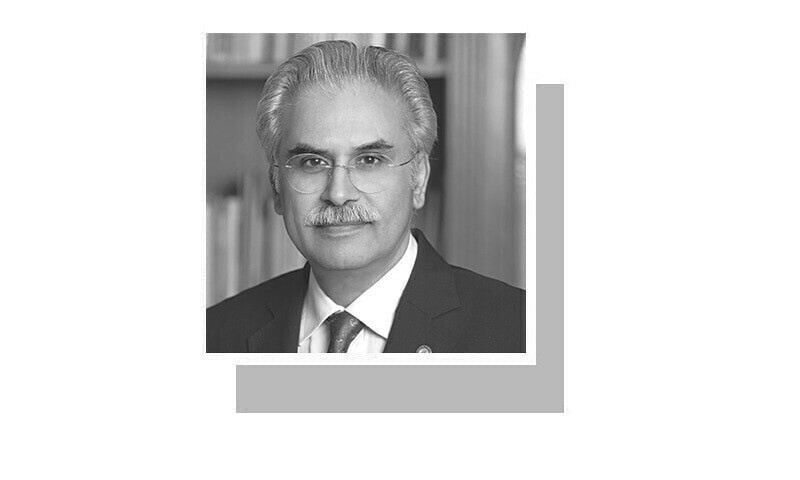
EVERY issue in Pakistan is linked to political instability and bad governance. These are two sides of the same coin, and they feed off one another. We have come to the point where people are losing hope, especially young men and women and those with small children. Who can blame them when political instability and uncertainty continue to grow, with no light at the end of the tunnel?
The quagmire is evident in our debt-driven economy and shameful human development indicators. Our neonatal mortality rate is second only to that of Lesotho, a sub-Saharan African country. If considered by region, the neonatal mortality rate in Balochistan alone would be the highest in the world. Two indicators put together speak volumes about the mess we have created in Pakistan by ignoring the people: 26 million of our children are out of school, which is the highest number in the world and around 40 per cent of children suffer from stunted mental and physical growth — that is, uneducated, stunted children. But these children are not yours or mine. They are out there somewhere. Sometimes we catch a glimpse of the tip of these icebergs from the windows of our air-conditioned cars, but we never realise the depths of the submerged mountains.
People are cracking under inflation. Bereft farmers and losing ‘winners’ with complaints of stolen mandates are running from pillar to post for respite against the scandalous wheat crisis and manipulated elections, respectively. These two contemporary crises amply reflect our overall state of affairs. A three-legged termite of helplessness, hopelessness and haplessness is busy eating us within.
The biggest problem of all is that there is ‘no problem’! With our heads in the sand, we constantly click ‘Inshallah’ and ‘Mashallah’ on our digital counters wrapped around our index fingers. A small orchestra is playing and a game of musical chairs is underway on the deck of, God forbid, the Titanic.
Human resilience is raising its head; a breath of fresh air seems to be finding its way in.
In a recent article, Miftah Ismail, twice finance minister of Pakistan, wrote, “we are fast reaching the point of no return…”. While elaborating on the rationale for why Pakistan needs a new political party, he lamented, “unfortunately, our existing political leaders are outdated, out of touch, and devoid of any vision for the nation’s future. I am sorry to say they lack both the courage and the competence to change the course of this country.” Difficult to disagree with this heavily evidence-based assertion, isn’t it?
Indeed, over the last five years, during which all the main political parties have been in power, the polycrisis has only proliferated. The last spike of ‘change’ has changed us in a strange way; only a battered and mindless popularity remains — nobody knows for how long and nobody knows what to do with it. Meanwhile, sight is blurry, breathing laboured and hope morbid.
In the midst of these, human resilience is raising its head and a breath of fresh air seems to be finding its way in.
Former prime minister Shahid Khaqan Abbasi started distancing himself from the PML-N as he disagreed with the party’s familial power-at-all-costs politics. He asserted that our problems have grown much too complicated, and no single existing party could resolve them without all stakeholders sitting down and planning seriously for the long term. But the ‘stakeholders’ are too busy sabotaging each other. Miftah Ismail was unfairly elbowed out and replaced by a returning finance minister, but he didn’t remain silent and started calling a spade a spade. Mustafa Nawaz Khokhar was asked to resign as the chair of the Senate Standing Committee on Human Rights for his ‘political positions’ and raising his voice against the custodial torture of political opponents. He smilingly said goodbye to the Senate and the party. How many such examples do we know of in our archaic game-of-thrones politics?
The three then joined hands and started ‘reimagining Pakistan’. A series of seminars were held across the country. I travelled to attend a few myself. One ran for seven hours non-stop, and another for nine, in severely cold weather. The halls were jam-packed. It is heartening to note that young people were the most active participants. They expressed their frustrations, hopes, efforts and suggestions. I came back from these seminars with a rekindling of hope.
Now a party is in the making. Not just a party, the foundations of a political institution are being laid, something none of us have ever experienced in the country.
Although we have beaten meanings out of words, don’t we want to see a party that is truly democratic, transparent in its decisions — including those involving its financing base — in which hereditary politics has no place, where all party offices are time-bound, and where a young party member at the lowest rung has equal opportunity to rise in the ranks? A party that provides Pakistanis with the opportunity to experience functional democratic politics, something none of us have ever experienced in our national lives? A party squarely focused on economic and human development in one go, not as a trickle-down that never trickles, and with a sharp focus on youth and women’s development? A party that restores Pakistanis’ confidence in their country and in responsible democratic politics? A party that not only reflects the aspirations of young people but also works hard to create equal economic opportunities for them by identifying, developing and realising Pakistan’s multiple comparative advantages in trade, in services, and import substitution manufacturing? A party that believes in restoring peace within and with neighbours?
And very importantly, a party that actually believes in the Constitution and does not hesitate to commit and uphold the principle of the establishment’s non-interference in politics?
All this sound too good to be true, and yet there is a ‘need for a new political party’. A new politics seems to be emerging at last!
The writer is a former SAPM on health and currently a professor of health systems & population health at Shifa Tameer-i-Millat University






